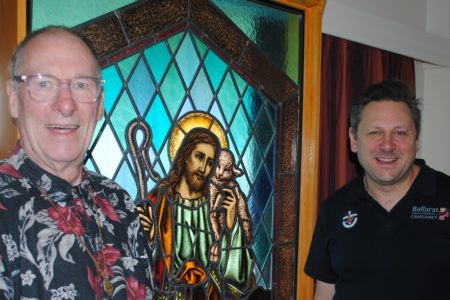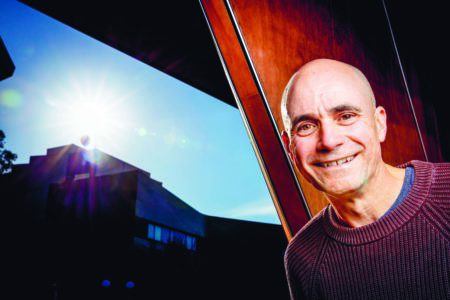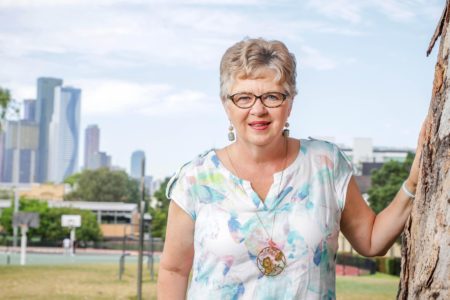Rev Deborah Kottek spends her days working in one of the harshest environments society knows. And she wouldn’t have it any other way. She spends a lot of time behind bars but doesn’t see the high walls, barbed wire, handcuffs and hardened criminals. Instead, she sees people, humanity and hope. People worth helping.
Interview by Stephen Acott
What is your title?
Prison Chaplain at Ravenhall Correctional Centre.
What do you do when you’re there?
I provide pastoral care and worship. I would love to have extra hours to do some Bible studies in prison, some spirituality group work, but there is just not enough time available.
First thing I do when I arrive in prison is look at the lists of people who are in the prison, which tells me where they are and what faith tradition, if any, they belong to.
Then I check for any referrals to see if anyone has asked to see a chaplain. I minister to people of faith and no faith so I talk to a lot of men who don’t fit the different Christian denominations identified on the prison listings.
I also look at who is in the Management units (up to 23 hours lockdown in a single cell) because this is where people are really doing it tough. It is a high-stress area and I make that a priority to visit there on a regular basis.
Then I look at the different units and see who’s in there that I might know or want to follow up with. And then I just head out, pen and notebook in hand.
I make a point of saying “good day” to just about every person I pass along the way – you never know who might need a bit of a kind word in their day.
There are weekly services, which I alternate conducting with the Anglican chaplains. I usually have between 20-50 men at each service.
I hold two worship services each time – one for Mainstream men and one for Protection men because they can’t mix together.
I also hold weekly smaller services in each of two forensic (maximum security) units. The people that come to worship in prison are diverse in faith background, culture and age.
Why do men of no faith come?
I just think it’s because we (UCA chaplains) do things a little differently, a little less formally. A lot of men go to many services from all faith traditions because it means they’re coming to a chapel, which looks a lot different to what they are used to seeing and experiencing.
It’s a space where they can relax a little because they are not being watched, they don’t have to deal with the politics that exists in the yard. But it is also a place where they are welcomed and hopefully where they can find peace and hope.
They certainly appreciate coming to service and I like to think they feel they belong and are part of a faith community. They certainly enjoy participating.
Is there a common thing they ask for or want to talk about?
The single thing I am most asked for is prayer – for themselves, for their families, their peers and the people they love, for compassionate and just treatment as they travel through the criminal justice system and for a new future beyond their time in prison.
Many prayers spoken by people in prison are for others – both people they know and for people they don’t know who experience suffering and struggle in the community and the world.
I am still taken with the expressions of gratitude and blessing that I often hear from men during prayer time in the chapel – this is huge when you think where they are, what they have experienced and that they are praying in front of the other prisoners in the room.
The other things the men want to talk to me about relate to their experiences in life. Especially things like grief and loss, past trauma, a sense of injustice, relationship issues and fear and anxiety about upcoming court hearings.
People really miss their families, loved ones and especially their children. In prison, you feel quite disempowered and disconnected from the world. Everything takes time and there is a process to follow – you really have to learn patience.
How many prisoners would you typically see in a day?
It is hard to say. Maybe 10 to 20. Some are quick catchups, others I might talk to for an hour. If there is a service, many more.
When did you start this job?
Five and a half years ago.
What were you doing before this?
I was the Uniting Church’s Senior Prison Chaplain. Prior to that I was the Mental Health Chaplain at Thomas Embling Hospital for three years and a Director of Mission at St John of God for 12 months.
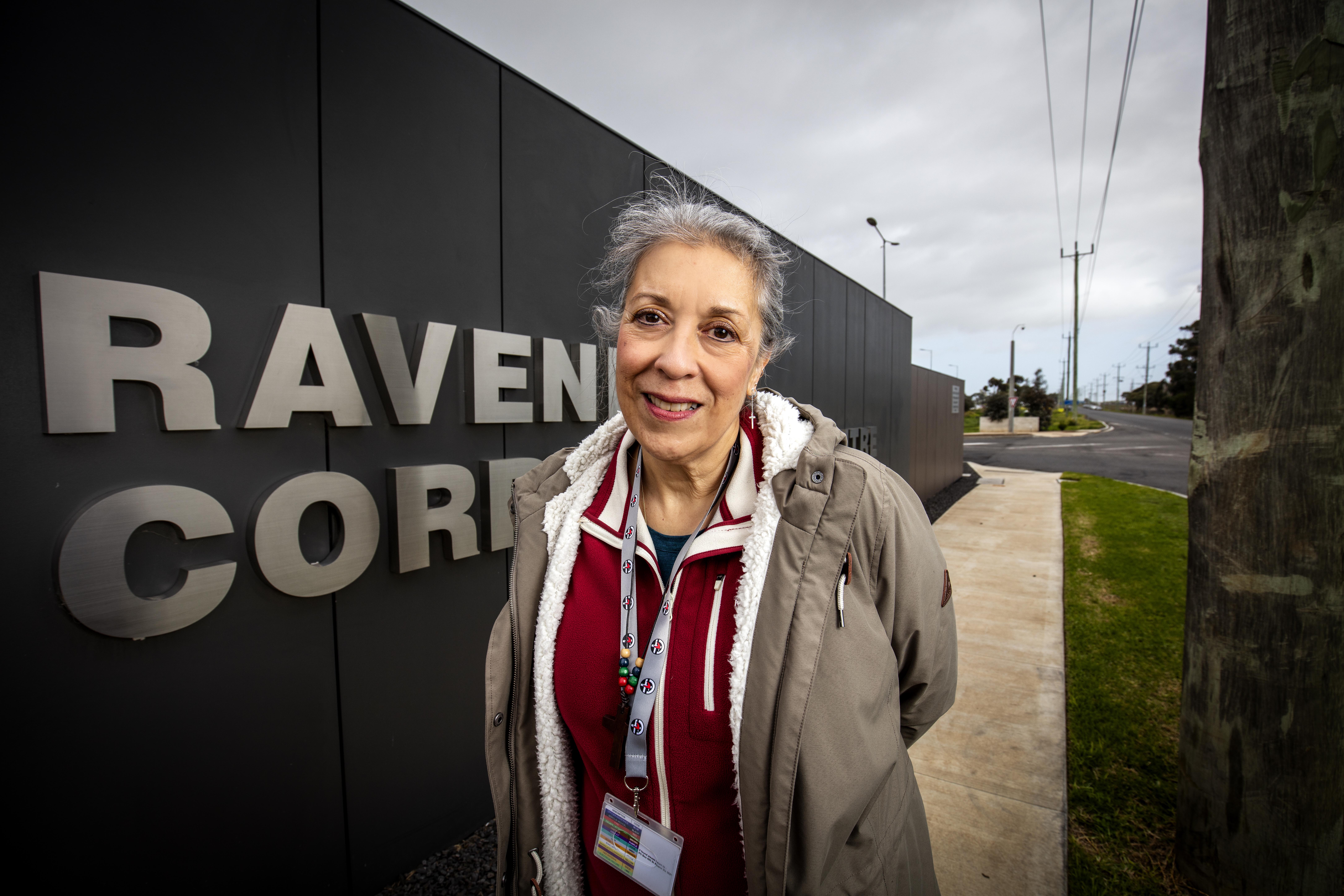
What attracted to you the job?
I have a passion to work with people that are marginalised and broken. I have a particular calling to ministry with people who struggle with severe mental illness.
What’s your primary objective?
It’s to serve God by caring for His people who are marginalised and in prisons. There is a huge need for the church to be present, and for the gospel to be heard. We are talking about people who have been doubly disadvantaged. They come into prison with a background of homelessness or disability or mental illness or poverty or no family connection or addiction or whatever led them to crime, and they are locked away as punishment.
But then we as society label people as prisoners, and people of no worth and we don’t want to have them in our worlds – we judge and blame and disassociate with them. Many come out of prison and have nowhere to live, no employment and no social network. What is the church doing about that?
I meet real people. People seem to forget that the reason these men came to prison is just one aspect of their lives. As a chaplain I get to talk to the person and get to see and hear all their stories. They let me into their lives and that is a privilege. I see them as human beings, not prisoners.
The gospel message is so powerful in prison. This is a place where the gospel needs to be proclaimed, where hope is desperately sought. Hope for a future, for salvation, for transformation – this is what it means to come to church in prison. It is here men come to hear about Jesus and to worship the God that loves them and has compassion.
I remind people about God’s grace and it is in the encounters with people that I find the presence of God.
Do some of them surprise you? You are dealing with some very hard-core criminals.
Yes I guess I am. I have been to every prison in the state and just about every Management unit so I have met a lot of people – and, I have to tell you, I get along with most people I meet. What a person has done to come into prison isn’t what is important and it is not something I raise with them – unless they want to talk about it, and some do.
I develop relationships with people over time. I get to know them and hear about their lives and it’s a unique connection. Probably the best way to put it is I companion people. I get to learn about their families and their lives on the outside and there is a level of intimacy that’s quite a privilege really.
What do you think prisoners get out of your visits?
I have some notes here that some prisoners have provided (see panel).
The thing about prison is nobody has a lot of time for you. Nobody wants to listen to your story. Officers are busy doing their jobs and have a lot of people asking questions, wanting things, so they love that chaplains listen and support the men.
You have a lot of time to think when you’re in prison, so a lot of past grief comes to the surface, past relationship issues. There are prisoners who are very anxious, or struggle with their mental health or have cognitive difficulties. Really listening to someone is so valued.
Has anything else surprised you?
I find it fascinating that people love coming to church. It wasn’t what I expected. I have people as young as 18-19 as well as people who are 80 coming along. They really feel upset if church is cancelled for whatever reason. Church is a nourishment to the men.
Do you deal with prisoners only? What about if they have a wife and children – do you see them as well?
Yes, part of my role can be supporting the families, but it’s not something I get into unless I need to. I may ring someone’s mother or partner and just let them know the prisoner is OK. My role is within the prison.
Prisoners are always portrayed as being very hard core people who shun sensitive emotion. Is that true of your experience?
I always see the human being. People may act tough when they are in the yard around other people they don’t know but when you talk to them on their own, it is quite different. People are people wherever they are, with feelings and emotions. I have seen tears even from people who have done some dreadful things.
Have you run into any famous prisoners?
Of course. I’ve seen many of them. Regularly. But I’m not interested in why they are there, I’m only interested in the person before me.
So how is George Pell holding up?
I have no idea! I don’t think he needs the Uniting Church’s support. He’s got the Catholic chaplains for support. We don’t step on each other’s toes as there are many more people in prisons in need of a visit.
I want to talk about the fact you’re a woman …
I’m not sure why being a woman is so important. I do have grey hair …
… that’s not what I want to talk to you about. Have you ever felt threatened or unsafe?
No. There was one time where I felt … not unsafe because there were officers outside the door … but there was a man who was severely mentally unwell and he was venting and I found it unnerving and tough because he was so loud at times, but I also felt safe.
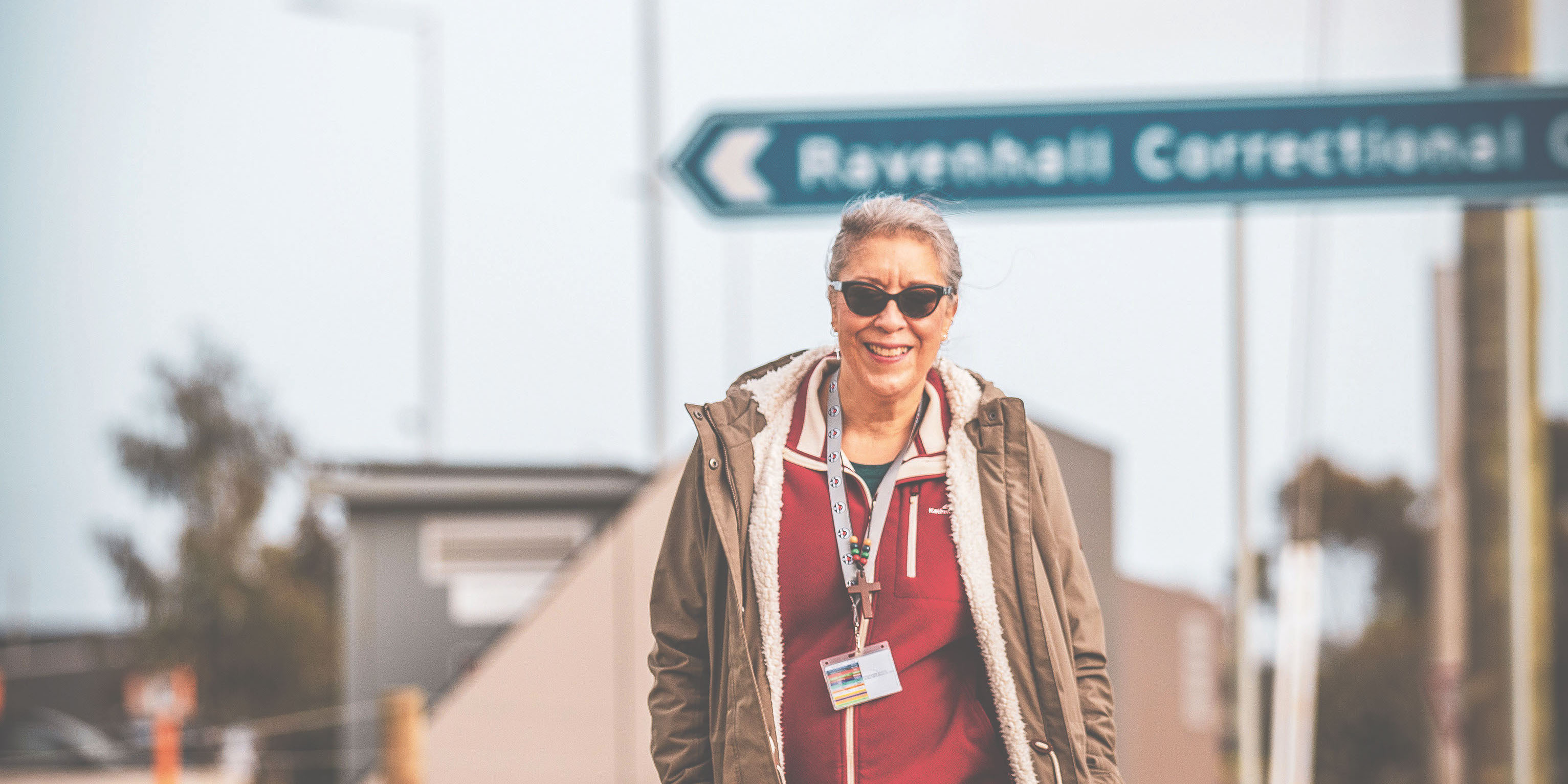
As a chaplain, because that is who I am rather than a woman, I am treated with so much respect and courtesy, even by the toughest of men. There are men who swear all the time and they’ll say “sorry miss” and I say “it’s all right!”. And if they don’t say sorry the guy next to them will say “show some respect, there’s a lady present”.
So I guess the men recognise me as a woman in that context, but still as a woman representing the church.
Do you have to watch what you’re wearing?
There are codes for dress as a contractor in prisons. I would never wear anything inappropriate – it is about being professional and functional. I spend a lot of time outside walking in the weather. I don’t wear anything too dressy, my hair is mostly up, but I still wear makeup, colourful clothing and my bangles and be myself because people in prison can smell a fake a mile away, so I’ve learnt that I need to be authentic – and I like to be myself. I do get comments on my (long, painted) nails. I don’t want to look like I am part of the prison. I prefer to remind people about a world outside of that place.
Have you ever been objectified as a woman?
No. I may have received compliments, but not about my physical features. I have been told I l don’t look my age, and I’m OK with that.
Do you think being a woman helps?
That’s difficult to answer because I don’t know what it’s like to be a man. Sometimes I certainly feel that mothering thing comes out in me, particularly with the young men. I find it easy to care for and care about people, but I don’t know if that’s because I’m a woman. We have male chaplains that love the ministry as much as I do.
What does your husband think about you doing this job?
It doesn’t worry him because he knows I love it.
Do you ever see prisoners once they’ve left?
No, boundaries are very important. We are employed to work in the prisons. The men often say “Deb where is your church, we want to come” and I go “whoa, no, this is my church right here”. One man has written to me, I gave my work number to a couple of the men and they’ve made contact, but I have not visited them. I’ve just had a chat and asked how they are going.
People need to find new supports and church communities to belong to on the outside. We can assist with transition, but we need to let go.
Are you aware of what crimes they have all committed?
Only the ones who have been in the media and it is hard not to know about. Sometimes people will tell me, but a lot of the time they don’t and I don’t ask them because it’s none of my business.
Have you ever had to deal with someone who you know has done a heinous crime, one that just makes your stomach churn?
Yes. There is someone who immediately springs to mind. He has never mentioned his crime to me, but he would know that I know about it because of the notoriety of the crime. I minister to him in the same way as I do to others. I see the human being, and what he has done I leave to God.
How does that make you feel sitting face to face with someone like that? Is it traumatic?
No, it’s not traumatic at all. Sometimes they might say “do you think God can forgive me” and I say “yes He can, there is nothing you can do that He can’t forgive if you are truly sorry and want to do things differently from here on”. Sometimes the men do believe God has forgiven them, but they struggle to forgive themselves. I don’t judge people in any way and I don’t blame people, otherwise I couldn’t do this ministry.
If you’re sitting down with a serial child sex offender, for example, don’t you find it hard not to judge them? You’re still a human being, wife, mother.
There is the behaviour and there is the person. I work with the person. The courts deal with the behaviour and so do the prison staff. The person is still a human being, he is still a child of God and I’m there to remind people that God is always present.
Do all prisoners acknowledge they’ve done the wrong thing?
No, not all. I can think of one person who has done a fairly heinous crime and I know he has not expressed remorse. But who knows whether this will change over time.
But aren’t you skirting around the edges and not getting to the heart of the issue? Don’t you at some point need to say “hey, we need to talk about what you did”?
No we don’t. I am not there to make people convert or to tell them “you must repent”, although this does come out in the gospel message sometimes. I pastorally care for people so I am present to a person whilst they explore what is happening in their lives. I am amazed by the actions of God in people’s lives though, because people do change – I am a witness to this.
Do the prisoners teach you anything?
Oh, gosh yeah. They teach me to be grateful, they teach me how lucky
I am …
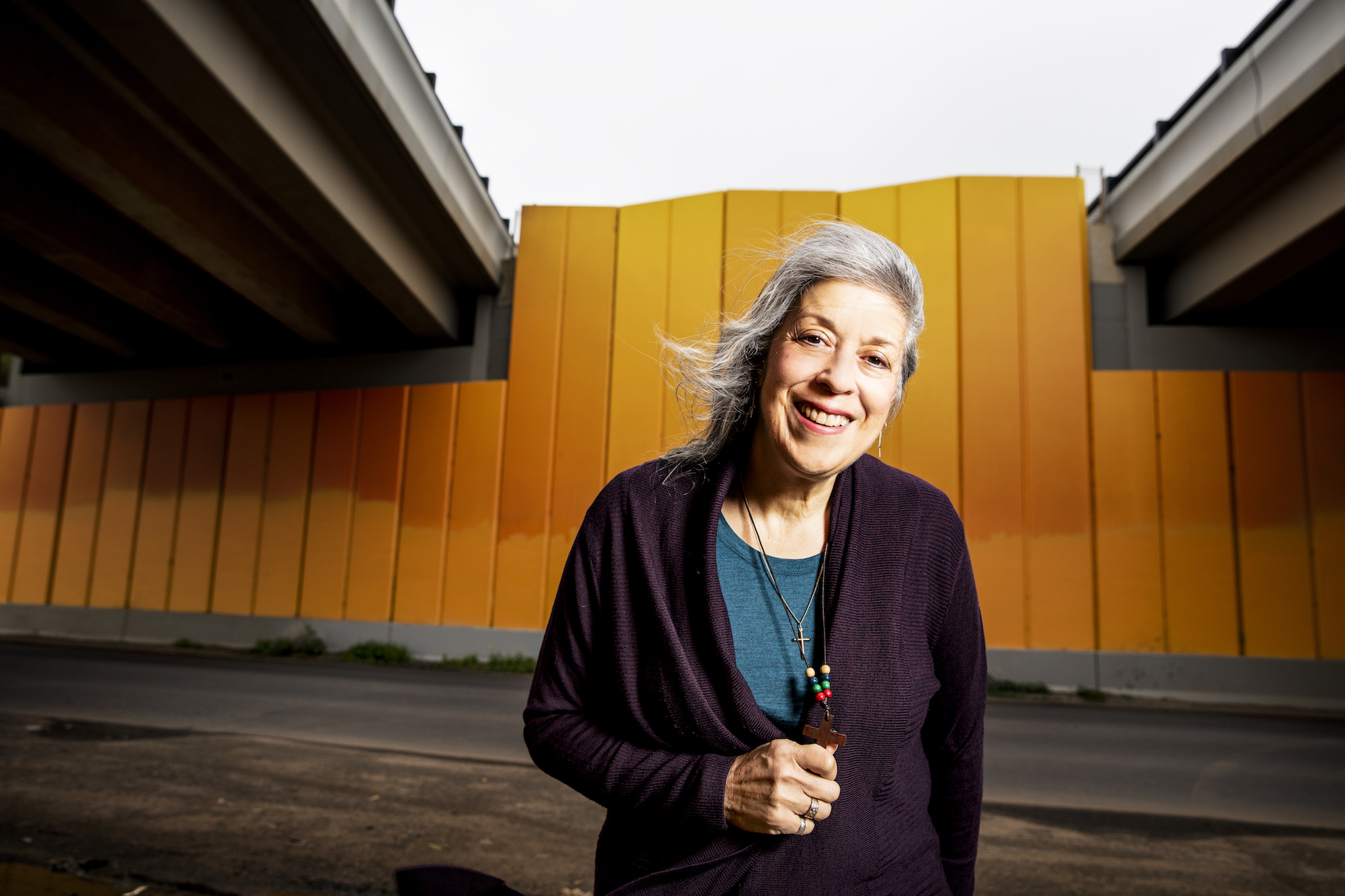 … Why are you lucky? Being a good citizen and not breaking the law isn’t luck.
… Why are you lucky? Being a good citizen and not breaking the law isn’t luck.
Most of the people in prison have had such trauma and tragedy in their pasts. I can’t believe the suffering some of them have survived and it’s little wonder they end up in prison. So that makes me feel quite privileged.
I’ve had a hard life, but I got a good education and I had a good profession so I could always get a job. Some people have just taken a wrong turn, or experienced a tragic event, or maybe they never had choices and opportunities in life. It doesn’t take much to send you down a slippery slope.
They’ve taught me about patience and appreciating life, simple things like that. How important family and relationships are. I also get to walk out the door and go home each day – I am so very lucky!
We’ve all seen prisons and prisoners depicted on TV and in movies. Are any of those portrayals accurate?
I try not to watch those sort of shows. Why would I? I used to be a nurse and could never watch hospital shows so maybe it is just my way. I see the real thing and speak with real people – there is no script that can possibly do justice to that.
I do love any BBC crime series though. The only prison movie that I can remember enjoying was The Green Mile.
What, not even The Shawshank Redemption?
I’ve seen it, but I can’t remember it. Prisons are a lot more modern and technologically advanced than those shows portray. I wouldn’t say they provide an accurate representation. Prisoners are in a structured, hierarchical environment that is very regimented. They are thrown in with a lot of people who they may not necessarily want to associate with.
Prisons are not easy places to live in, let me tell you.
Letters from prisoners
The following letters have not been edited.
Prisoner A
When I came to prison I was shutting everyone out – distant, emotional and felt alone. I felt like I was stuck here for good Because my lawyer failed to show up 4 times so I felt like I was forgotten about. I’d cry a lot and Just wanna give up until my custody officer ask me whats wrong so I explained it all and how when arrest my cross was taken from me. Within an hour Deb the chaplain come to see me and after we spoke for a while we said a pray for myself and my children and I then was handed a cross and Bible and from that moment on every day has become so much easier and my courts goin well my kids are now back in my life and Im no longer shutting people out and to top it off I get to pray with fellow prisoners who Also Believe and live By the word of our Almighty god. And sing together so the Benefits to the chapel and chaplins are it renews hope for people who are or have given up on all hope of Bein saved, it also gives people something to Believe in when they have nothing left. For me I sit quietly in my room for 15mins every night talking to god thanking him for everything and during the day without even noticing I find myself rubbing my cross (necklace) with my fingers Talking to god asking him random But general questions like should I play some Fast Ball etc. So there are many Benefits and all Big Positives
Prisoner B
(Coming to worship) creates a place of inner salvation and (a) place to let the walls & barriers, of strength and hope needed to survive in a place filled with fear and evil. It enables us to find salvation and peace amongst that terror. (It) creates our own community of trust and confidement. I find it very powerful and loving, empowering and enlighterning.
Prisoner C
In every season of life all of us need positive roll-models, to encourage, support, advise, direct and sometimes just to listen to us, and guide us toward a better path in life. Even more does this need present itself when a person is incarcerated, separated from loved ones and surrounded by the concentrated darkness that exists in these settings. So, in my opinion, the chaplains are just as necessary as the food we eat, actually moreso. God uses them to save lives, if you miss a meal, chances are you won’t die, without chaplaincy in prison, people would find themselves in desperate situations without help or hope. More access would definitely be beneficial to the inmates, do what I would request is, send more help. Chaplains are a vital, irreplaceable necessity.
Prisoner D
I believe that chaplaincy delivers the good word that is healthy for our behaviour & we must be encouraged to work inwards on ourselves with gods teachings to benefit ourselves, others & all beings. There is a good God.


